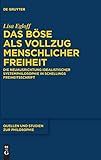Das Böse als Vollzug menschlicher Freiheit : Die Neuausrichtung idealistischer Systemphilosophie in Schellings Freiheitsschrift / Lisa Egloff.
Material type: TextSeries: Quellen und Studien zur Philosophie ; 128Publisher: Berlin ; Boston : De Gruyter, [2016]Copyright date: ©2016Description: 1 online resource (VI, 289 p.)Content type:
TextSeries: Quellen und Studien zur Philosophie ; 128Publisher: Berlin ; Boston : De Gruyter, [2016]Copyright date: ©2016Description: 1 online resource (VI, 289 p.)Content type: - 9783110474824
- 9783110474886
- 9783110475975
- online - DeGruyter
- Issued also in print.
| Item type | Current library | Call number | URL | Status | Notes | Barcode | |
|---|---|---|---|---|---|---|---|
 eBook
eBook
|
Biblioteca "Angelicum" Pont. Univ. S.Tommaso d'Aquino Nuvola online | online - DeGruyter (Browse shelf(Opens below)) | Online access | Not for loan (Accesso limitato) | Accesso per gli utenti autorizzati / Access for authorized users | (dgr)9783110475975 |
Diss Universität Freiburg 2014.
Frontmatter -- Inhalt -- 1. Einleitung -- 2. Kontext -- 3. Das Böse als Freiheitsvollzug -- 4. Die Neuausrichtung des Systems -- 5. Anhang
restricted access online access with authorization star
http://purl.org/coar/access_right/c_16ec
Die idealistische Metaphysik der Freiheit und die ihr eigene Systemproblematik stehen im Zentrum dieser historisch fundierten Deutung der Freiheitsschrift F.W.J. Schellings. Das Böse ist die zentrale Herausforderung für das systematische Denken der Freiheit. Schelling verhandelt mit ihm 1809 eine Grundfrage der idealistischen Metaphysik: die systematische Vereinbarkeit von Freiheit und Notwendigkeit. Er grenzt sich dabei von Kants und Fichtes Freiheitsbegriff ab sowie der Freiheitsphilosophie seines eigenen Identitätssystems. Sie bilden die Folie der gedanklich bündigen Rekonstruktion des systematischen Neuansatzes Schellings 1809. Die Autorin wagt eine Neuinterpretation der Freiheitsschrift, welche nicht die Theodizeeproblematik, sondern die idealistische Systemfrage in den Mittelpunkt rückt. Sie expliziert die systematischen Fragestellungenim Deutschen Idealismus und berücksichtigt gleicherweise die im Hintergrund wirksame Tradition des (Neu)Platonismus wie die angrenzenden theologischen Überlegungen.
Evil is the core challenge in thinking about freedom. With keen historical awareness, this study reconstructs the problematic interrelation between freedom and necessity in German Idealism and illuminates Schelling’s systematic approach around the year 1809. This reinterpretation of Schelling’s treatise on freedom considers systematic and theological questions as well as the effective tradition of Platonism and Neo-Platonism.
Issued also in print.
Mode of access: Internet via World Wide Web.
In German.
Description based on online resource; title from PDF title page (publisher's Web site, viewed 28. Feb 2023)


